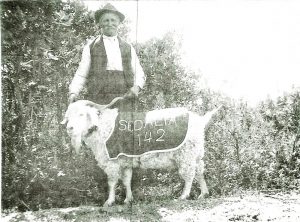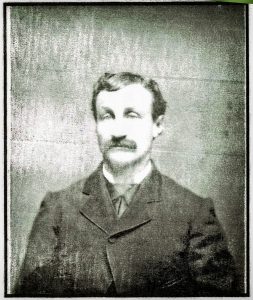Adam Martz: One Could Get His Goat
By Joe Gschwendtner; courtesy photos

For years, the reigning mascot of the local Order of Foresters was “Billy Goat.”
Adam Martz, perhaps Sedalia’s most famous bachelor, was no shrinking violet. Those who have opined on his life, alleged that he was never outsmarted. In a bit of hyperbole, the Castle Rock Journal once reported in print that “any person who thinks he can get the best of Adam (by hard-nosed negotiating) will be guaranteed to take a hard fall.”
Among the many restless souls of his time, Martz was born in Lancaster County, Pennsylvania. He migrated west, first to Storm Lake, Iowa. There he took to raising cattle, butchering them for profit and selling the meat at retail prices in his own store. It appears he was engaged to be married but was stood up at the altar – jilted. Whether this cemented his bachelorhood or not, he clearly decided to continue west.
In the early 1900s, Martz moved once more, finding our Sedalia much more to his liking. Initially, he turned again to butchery as his trade. But he hedged that bet by also homesteading 160 acres west of Sedalia.
How he grew into his sawyer/logger career is unclear, but his source of wood was Adam Kingsley’s land on Garber Creek. After hauling the timber with his own team of horses down perilous Devil’s Gap, Martz would spend his days “cutting, sawing, planing and edging trees,” according to accounts.
Later he sold the processed wood, pilings, fence posts, firewood and even telephone poles at his Sedalia lumberyard. Telephone poles sold 10 for $5. Names in his 1908 diary suggest that virtually every rancher in the Sedalia area used his products. The DuPont Company in Louviers was also a major customer, utilizing his poles for town telephone lines. Local workers were paid a dollar a day to install them within the company village, including Kellytown.

Adam Martz was a Jack-of-all-trades and master as well.
Martz was yesteryear’s multitasker. He raised most anything that would grow, both plant and animal. Bees, pigeons, guinea hens and ducks. His inventory of animals was nothing short of a menagerie. Pigs were his mainstay, and he raised, slaughtered and rendered them for retail. He also raised goats, parts and pieces of which he merchandised to the last bleat. Milk and meat went to their respective markets, with hides sold to local tanners. Opportunistically, and since veterinarians were in strong demand, Martz sidled into the castration business, neutering many a local animal. It seemed as if there was nothing the man could not do. Also, working as an excavator, a few of Sedalia’s statelier homes were built upon his foundations.
A longtime, deeply passionate member of the International Order of Foresters Lodge #142, Martz provided the organization with a mascot, anointing his goat “Billy Goat” as a perfect candidate for the position. There was never a parade or ball with Foresters participation in which Billy Goat did not appear. This included the yearly grand march into downtown Denver.
Martz the man, was nothing if not gregarious and known to host friends for a meal and overnight accommodations whenever they passed by his homestead. Martz died of cancer in 1933 at 49 years old and is interred at Bear Canon Cemetery.